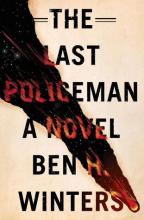inspiration + perspiration = invention :: T. Edison ::

If being paranoid doesn't mean they aren't after you, is it fair to call a book nihilist if its primary premise is the imminent destruction of the Earth? Such a work arguably must include this view in order to offer any credibility, and yet I found this one's postmodernist dip into the last days so weighed down with existential angst that the mystery barely registered or offered much in the way of tension.
It's hard to feel much sympathy for victims or detectives when the narrative continually pushes the message that no matter what, they'll all be dead in a few months anyway. Which, perhaps, is the point, but one that could have been made with far less prose to wade through.
In this pre-apocalyptic tale of life before the end, Detective Hank Palace is faced with an apparent suicide that he stubbornly refuses to believe is as simple as it appears. It's the classic lone-cop-against-the-world plot, only his world is soon to end. Even the best of the best have nearly given up. He's continually faced with the dilemma: should he spent time and resources looking into this case? What will be gained from uncovering the truth, and what might be lost? In such a scenario, should a murderer simply be allowed to get away with it?
These are fascinating questions, certainly, and if Palace had offered much in the way of an interesting character I might have found the exploration of them as intriguing as the premise. But despite being surrounded by colorful personalities, Palace himself is an enigma of roiling possibilities, a Hamletesque fellow who can't quite settle on an appropriate course of action until the penultimate moment. In one chapter he follows this trail, another chapter that, and though he express disdain for his colleagues' surrender to the malaise of their world, he himself seems stuck in an emotional funk with no real motivations or goals to drive him beyond the next idea he stumbles upon.
The mystery itself offers little to make up for the protagonist's vanilla flavoring. Palace isn't a very good detective, and the plot doesn't twist and turn so much as slowly churn toward a conclusion that I hardly cared about by the end. There were times I had to return to previous chapters simply to refresh my memory of what was at stake. Grand reveals left me feeling hollow rather than excited. In the end, in true nihilist fashion, it little mattered anyway.
If the story left me cold, the prose at least was a delight to read. Author Ben Winters knows how to weave sentences and passages together, and while Palace himself didn't excite my attention the other myriad characters and facets of this world did. The best moments of the book delved into how different people and societies reacted to the Sword of Damocles hanging over everyone's head, and how these reactions didn't remain static but morphed over time. This novel might have been better served as a collection of separate narratives rather than attempting to unify them all under the banner of a murder mystery.
It's not my cup of tea, but The Last Policeman on Earth has the writing chops to offer a glimpse into one unique potential future. I'll leave it for you to decide whether wading through the slush of mankind's collective fears sounds appetizing. For my own part, nothing about Palace's journey enticed me to pick up the sequels.
This review is also posted on Goodreads and Amazon. I did not receive anything from the publisher or author for this review. The cover was designed by Doogie Horner. The book is currently available from Quirk Books as a Paperback ($9.34) and via Amazon as an eBook ($1.99).





